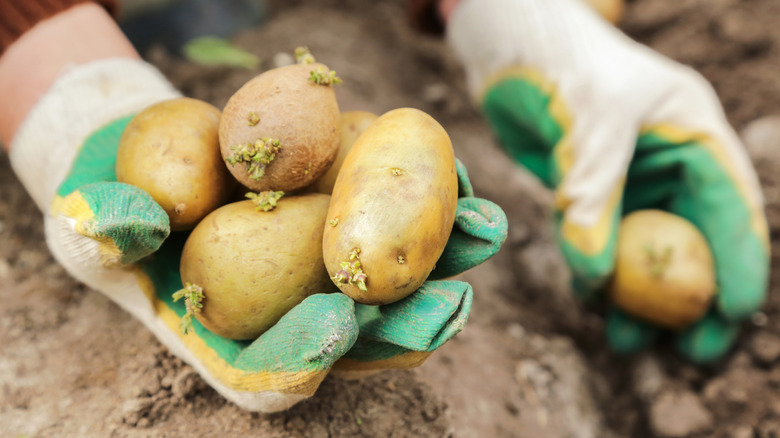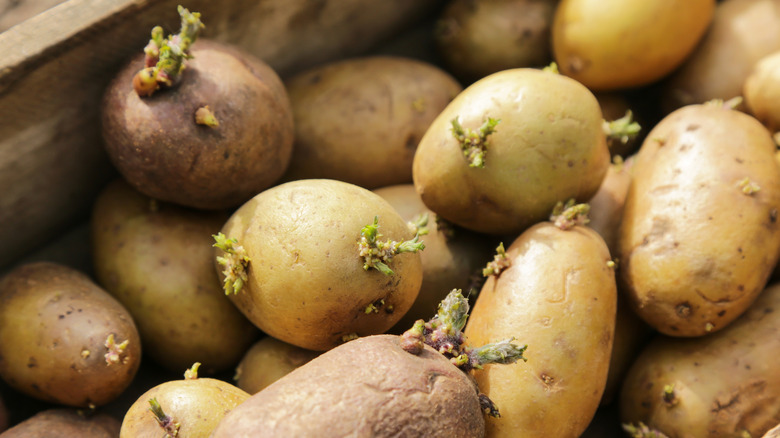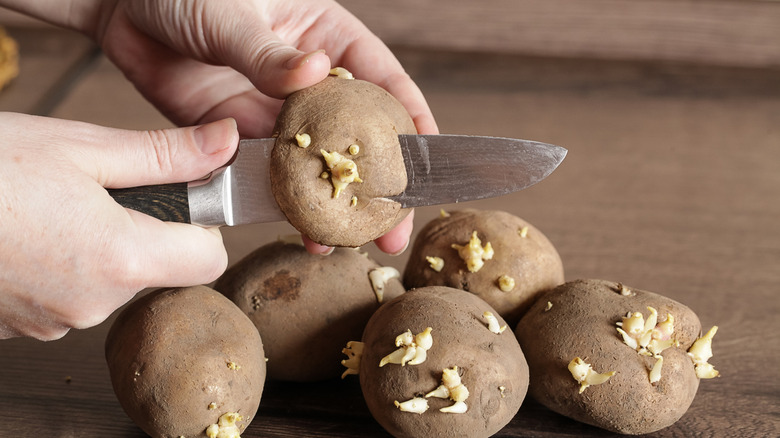Can You Plant Supermarket Potatoes In The Spring? Our Professional Gardener Weighs In
Being a professional gardener, I enjoy advising beginners on how to grow their own food. One crop I always recommend trying is potatoes because they're easy to grow and there are so many wonderful varieties. However, if you're like me, you may have wondered: Can I use supermarket potatoes that sprouted eyes instead of buying pricey seed potatoes? The answer is an enthusiastic yes; you can plant supermarket potatoes just as you would seed potatoes.
First of all, you want to get the timing right. You can start your seed potatoes as early as April, so most gardeners buy them in March. I confess, I've had potatoes start sprouting in February and I just hang onto them hoping for the best. Keep them dry in a brown paper bag; if they get mushy or have a strong musty smell, toss them. Supermarket potatoes purchased in March — especially organic ones, which often start to sprout within two weeks — have a good chance of being ready for planting by early April.
But how do you know your sprouting potatoes are ready for planting? Ideally, you want a bit of vine emerging from the eyes — even just ½ inch makes for a very viable potato — but I've sometimes had vines get long and start wrapping around the potato. Try to be careful when you plant them not to break the vines, but don't worry too much since more vines can grow. Whether you plant potatoes in the ground or in containers, they're easy to grow and a delicious way to begin your journey as a gardener.
Which potatoes to plant
You can plant any kind of potatoes you want, but with this method, I highly recommend starting with organic potatoes, if possible, for two reasons. First, organic potatoes tend to be more hardy and disease-resistant than potatoes grown with pesticides or chemical fertilizers. Secondly, organic potatoes tend to go to seed and sprout faster, usually formng eyes and sprouts within two to four weeks after harvest if they're mature. "New" potatoes might take longer, but those are most likely not the ones you use in spring anyway.
I start buying, ahem, "fancy" organic potatoes at the grocery store starting in January. Trader Joe's often has a good selection of organic potatoes, and your local farmers' market may have them in cold storage to sell during the winter. Some varieties keep better than others, so you don't have as wide a selection as you would if you buy seed potatoes via mail order or at a nursery. Two kinds I love and am willing to buy via mail order are French fingerlings and Kennebec potatoes; both can be hard to find in stores in late winter and for me, they're worth every penny.
If you really want to know the exact variety of potato you're growing, supermarket potatoes make this difficult: They're often labeled simply by color or by type, such as "russet" or "baking potatoes." I've had good luck with the little "gourmet" assortments of miniature potatoes, which often include white, yellow, pink, red, and blue varieties. Organic russets are also worth growing since they're so versatile and have good storage life.
To cut or not to cut?
Some growers use a process called "chitting," which means putting potatoes under light or out in the fresh air to speed up the sprouting process. Other suggested steps include cutting the potatoes and dipping the ends in wood ash. Chitting is a somewhat eclectic and variable practice and how it's done depends on whose advice you're following. Honestly, I've never tried this technique before, because I've had great luck just using my "forgotten" sprouted potatoes right out of my simple brown paper bag.
If my sprouted potatoes are large ones with plenty of nice big eyes, I cut them into two or three pieces; a small potato with one sprouting vine should also grow fine. Cutting the potatoes before sprouting them does risk having them dry out, and be sure to use a clean knife to avoid spreading any possible diseases. You can put them on a tray in a cool, dry place or put them back in the paper bag. Or, just let them sprout whole and cut them before planting if desired. Potatoes are very forgiving!
I like to have a mix of varieties when I plant my supermarket potatoes, and plant some every couple of weeks to extend the harvest time. My favorite potato varieties that I think every gardener should know about are Rose Finn Fingerlings, Kennebec, Adirondack Blue, German Butterball, and Red Gold. You may even decide to store some of your harvest over the winter and use the sprouted potatoes in spring for planting, but growing your own delicious organic potatoes — and knowing you did it in a thrifty, sustainable way — is its own reward.


